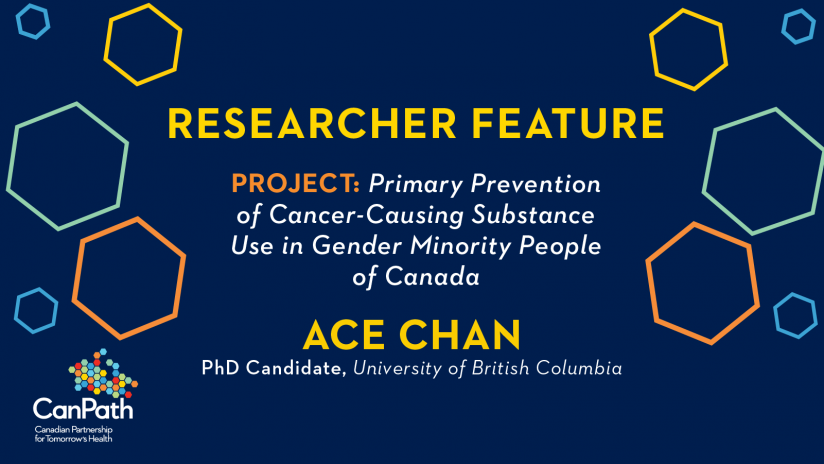Researcher Feature: Ace Chan

Check out this Q&A with Ace Chan as we dive into Ace’s project inspirations, motivations, methodologies, and more!
About Ace Chan:
Ace Chan is a PhD Candidate in the School of Population and Public Health at The University of British Columbia. Ace was awarded the Trainee Award for Innovative Thinking to Support LGBTQI2S Health and Wellness in 2018 and entered a four-year Doctoral Fellowship for their doctoral studies in 2020. Ace has also been awarded CIHR’s Graduate Scholarship Doctoral Award, for the dissertation research that will be conducted. Ace’s research interests include sexual and gender minority (SGM) health, creating inclusive and accessible healthcare spaces for SGM folks, and Ace strives towards providing scientific evidence to achieve health equity in marginalized populations. Ace has demonstrated the ability to communicate science to people of all ages including stakeholders, with former positions at Telus World of Science, as a community scientist and being a part of the leadership team for the BC Knowledge Translation Community of Practice.
What inspired you to research cancer prevention among Gender Minority (GM) people, and why is it important?
My undergraduate degree was in cell physiology, where my main focus was learning about biological systems on a micro-scale. Using the knowledge and skills that I acquired from that training, I worked at a neuroscience lab. I quickly realized that working on a model organism at a wet lab was unfulfilling for me — I wanted to connect with people while conducting research. I took a dive into health literature to see what resonated with me, as I wanted to pursue further education. My previous role as a queer youth support worker drew me to queer health literature. As I began to learn more about public health and social determinants of health, I became aware of how systems of oppression and marginalization affect health outcomes and healthcare access for queer people.
Even though gender identity and gender expression have been protected by the Human Rights Act in Canada since June 2017, stigma, discrimination, and violence toward the gender minority community persist. I am interested in examining how experiences of systemic oppression have an influence on the health of gender minority people.
What motivated you to apply for CanPath data for your graduate research?
I wanted to challenge myself and run analyses that I have not yet had the chance to, due to data limitations. For instance, there are not many Canadian longitudinal datasets that include a question on gender identity which creates gaps in knowledge about the health of gender minority people in Canada. Realizing that CanPath’s survey included a question on gender identity motivated me to apply to use CanPath data for my dissertation, as my research interest is also in cancer prevention. I was also intrigued by the studies that have been published using CanPath data, and the impact they have had on the healthcare system.
Can you tell us more about your research methodologies?
CanPath assesses gender identity with a 2-step method: 1) What is your sex at birth? 2) Which best describes your current gender identity? With these two questions, we will be able to identify participants whose sex assigned at birth is discordant with their gender identity. From there, we will run longitudinal data analyses to determine if there were changes in cancer risk factors, over time. We want to understand those changes in cancer risk factors from community members, through interviews with GM people.
How might your research findings contribute to the existing knowledge on cancer prevention among GM people? How might they impact policies and interventions to reduce cancer risk in GM communities?
The existing knowledge on cancer prevention among gender minority people has grown in recent years, but research for this community remains dearth. I hope to add to the literature, rigorous and impactful research that will benefit members of the gender minority community. We want to create lasting systemic change for gender minority people because access to healthcare and the development of adverse health outcomes should not be dictated by gender identity or gender expression.
Research and subsequent knowledge translation are excellent tools for equity because they serve to tell untold stories about marginalized communities. With these stories, we can build empathy and competency among key decision-makers like politicians.
What are some of the implications of your research for population health, and how can it contribute to reducing cancer burden in GM communities in Canada?
My dissertation research focuses on primary cancer prevention in gender-minority communities. The results from this research could have vast policy implications—the implications we make for the community will be guided by gender minority people, as we want to center the voices of people from this community. Our results will help reduce cancer burden in GM communities because we can examine the relationship between systemic oppression and cancer-causing lifestyle behaviours in GM people. Our goal is to provide the evidence needed to develop policies to reduce cancer health inequities in GM communities.
Any final thoughts you would like to share with our readers about your project?
A lot of literature documents gender minority people and their health inequities and poor health outcomes. While this is indeed true, it is also important to remember that joy exists in these communities as well. I am grateful to be part of a growing network of researchers and practitioners who care deeply about safe and equitable healthcare for this community. I am deeply aware that this kind of research is not possible in many parts of the world, even in our own continent and I am dedicated to transforming systems in Canada and hopefully influencing global research in the future.
Are you a graduate student interested in cancer prevention? Consider using CanPath data for your research! Learn more by checking out our Access Process or getting in touch with our Access Officer.